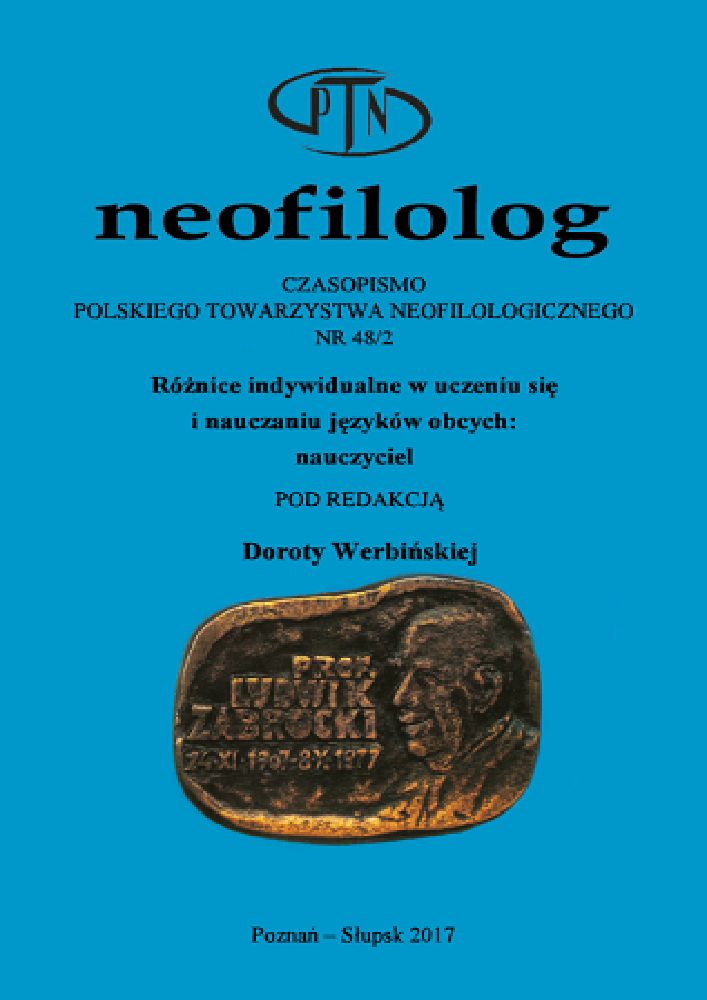Abstract
The article concerns pre-service English language teacher training and discusses some results of an on-going action research project, the aim of which is to investigate a way of supporting student reflection while they do obligatory teaching practice in Polish state schools. The paper presents the design of the “Develop by Blogging” intervention, as well as its pilot implementation. Preliminary findings suggest that the intervention has the potential to create time and space for reflection on individual professional experience and can constitute a chance for enhancing reflection among pre-service teachers.
Literaturhinweise
Brown, A. H. i T. D. Green. 2016. The essentials of instructional design: Connecting fundamental principles with process and practice. New York: Routledge.
Cherry, N. 2002. Action Research: a pathway to action, knowledge and learning. Melbourne: RMIT University Press.
Conole, G. 2012. Designing for learning in an open world. Dordrecht: Springer.
Creswell, J. W. 2013. Projektowanie badań naukowych. Metody jakościowe, ilościowe i mieszane. Kraków: Wydawnictwo Uniwersytetu Jagiellońskiego.
Czura, A. 2014. „Wprowadzenie”. Neofilolog, 43(1): 5-6.
Farrell, T. S. 2007. Reflective language teaching: From research to practice. London: Continuum.
Fisher, L. i D. Kim 2013. „Two approaches to the use of blogs in pre-service foreign language teachers’ professional development: a comparative study in the context of two universities in the UK and the US”. The Language Learning Journal, 41(2): 142-160.
Gabryś-Barker, D. 2012. Reflectivity Pre-service Teacher Education: A Survey of Theory and Practice. Katowice: Wydawnictwo Uniwersytetu Śląskiego.
Garza, R. i S. F. Smith. 2015. „Pre-service teachers’ blog reflections: Illuminating their growth and development”. Cogent Education, 2: 1066550. http://www.tandfonline.com/doi/full/10.1080/2331186X.2015.1066550 DW 09.07.2017.
Gay, L. R., Mills, G. E. i P. W. Airasian. 2011. Educational research: Competencies for analysis and applications. Upper Saddle River: Pearson Education.
Górecka, J. i A. Nowicka 2015. „Uczenie się w interakcjach argumentacyjnych a tożsamość ucznia jako rozmówcy”. Lingwistyka Stosowana, 14: 41-55.
Jodłowiec, M. 2005. „Developing a Reflective Practitioner: A Teacher Educator’s Perspective”. (w) Studies in Teacher Education: Language, Literature, and Culture. (red. M. Misztal i M. Trawiński). Kraków: Wydawnictwo Naukowe Akademii Pedagogicznej, str. 9-16.
Killeavy, M. i A. Moloney. 2010. „Reflection in a social space: Can blogging support reflective practice for beginning teachers?”. Teaching and Teacher Education, 26(4): 1070-1076.
Kolb, D. 1984. Experiential Learning. Englewood Cliffs, New York: Prentice Hall.
Komorowska, H. 2015. „Rozwój glottodydaktyki a kształcenie nauczycieli języków obcych”. Postscriptum Polonistyczne, 2(16): 11-29.
Luik, P., Voltri, O., Taimalu, M. i K. Kalk. 2011. „On the use of student teacher blogs during teaching practice”. Procedia-Social and Behavioral Sciences, 11: 165-169.
Mor, Y. i B. Craft. 2012. „Learning design: reflections upon the current landscape”. Research in learning technology, 20 (sup1): 19196.
Mor, Y. i O. Mogilevsky. 2013. „The learning design studio: collaborative design inquiry as teachers’ professional development”. Research in Learning Technology, 21(1): 22054.
Schön, D. A. 1983. The reflective practitioner. How professionals think in action. New York: Basic Books.
Stiler, G. M. i T. Philleo. 2003. „Blogging and blogspots: An alternative format for encouraging reflective practice among preservice teachers”. Education, 123(4): 789-797.
Yang, S. H. 2009. „Using blogs to enhance critical reflection and community of practice”. Educational Technology & Society, 12(2): 11-21.
Wilczyńska, W. i A. Michońska-Stadnik. 2010. Metodologia badań w glottodydaktyce: Wprowadzenie. Kraków: Avalon.
Wygotsky, L. S. 1971. Wybrane prace psychologiczne. Warszawa: Państwowe Wydawnictwo Naukowe.
Zawadzka-Bartnik, E. 2014. „Refleksja w zawodzie nauczyciela – założenia a realne możliwości realizacji”. Neofilolog, 43(1): 7-23.
Netografia
http://developbyblogging.weebly.com DW 09.07.2017
https://elsbetha.wordpress.com/2016/03/02/the-solution/#comments DW 09.07.2017
https://pollytheteacher.wordpress.com DW 09.07.2017
http://sjp.pwn.pl/sjp/refleksja;2573649.html DW 09.07.2017
https://wordpress.com DW 09.07.2017
http://www.edmodo.com DW 09.07.2017
http://www.tesol.org DW 09.07.2017
Lizenz
Copyright (c) 2017 Joanna Pitura

Dieses Werk steht unter der Lizenz Creative Commons Namensnennung - Keine Bearbeitungen 4.0 International.
Autoren:
Die Autoren der zur Veröffentlichung in der Zeitschrift Neofilolog angenommenen Texte sind verpflichtet, den Vertrag über die Erteilung einer kostenlosen Lizenz für die Werke mit der Verpflichtung zur Erteilung einer Sublizenz CC auszufüllen, zu unterzeichnen und an die Adresse der Redaktion zurückzusenden.
Gemäß Vertrag erteilen die Autoren auf die in der Zeitschrift Neofilolog veröffentlichten Texte der Adam-Mickiewicz-Universität in Poznań eine nicht exklusive und kostenlose Lizenz und erlauben die Verwendung der Sublizenz Creative Commons Attribution-NoDerivatives 4.0 International (CC BY-ND 4.0).
Die Autoren behalten das Recht zur weiteren freien Verfügung über das Werk.
Benutzer:
Interessierte Onlinebenutzer dürfen die seit 2017 veröffentlichten Werke unter folgenden Bedingungen nutzen:
- Anerkennung der Urheberschaft - die Verpflichtung, zusammen mit dem verbreiteten Werk Informationen über die Urheberschaft, den Titel, die Quelle (Links zum Originalwerk, DOI) und die Lizenz selbst bereitzustellen;
- ohne Schaffung abgeleiteter Werke - das Werk muss in seiner ursprünglichen Form erhalten bleiben, ohne Zustimmung des Autors dürfen keine Studien, beispielsweise Übersetzungen, verbreitet werden.
Die Urheberrechte aller veröffentlichen Texte sind vorbehalten.
Sonstige:
Die Adam-Mickiewicz-Universität in Poznań behält das Recht auf die Zeitschrift als Gesamtheit (Layout, Grafik, Titel, Umschlagsprojekt, Logo usw.).
